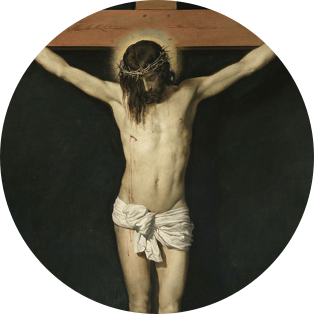
The Bible
The original manuscripts of the Bible were inspired. They were written by men who were guided by the Holy Spirit. These men produced the sixty-six books which make up the innerrant Word of God. This is our standard for everything we do and believe. (2 Timothy 3:16, 17; 2 Peter 1:19-21; Ephesians 4:1-6).
The Triune God
There is one true and living God who is infinite and perfect. God is the Creator and Supreme Ruler of the universe. He is inexpressibly glorious in holiness, worthy of all honor, confidence, and love. He eternally exists in three distinct Persons: Father, Son, and Holy Spirit—these three being identical in nature. (Exodus 20:2, 3; Deuteronomy 6:4; Matthew 28:19; John 4:24; 1 Timothy 2:5; 1 Corinthians 8:6).


God the Father
God the Father is a person separate from God the Son and God the Holy Spirit. He is the architect and originator of all things, and He concerns Himself with the affairs of men. He elects and draws men unto salvation, and has a fatherly relationship to all believers. (Genesis 1:1; Proverbs 30:2-4; Isaiah 41:10; Matthew 3:16, 17; 28:19; John 6:37-40; Acts 14:17; 17:23-28; Ephesians 1:3-5; Hebrews 11:3, 6; Revelation 4:11).
God the Son
Jesus Christ is truly and eternally God the Son. He was conceived by the Holy Spirit and born of the virgin Mary. He became perfect man, and remains with an incapacity to sin. He revealed His deity through His miracles and teachings. He shed His blood for the sins of all men as a substitutionary sacrifice, but arose bodily from the grave. He returned to heaven in His glorified body and is seated at the right hand of God, where He makes intercession on behalf of His people. He is personally coming in the air to rapture His church prior to a seven-year tribulation period, and He will personally return to the earth after the tribulation to establish His earthly kingdom. (Genesis 3:15; Isaiah 7:14; Matthew 1:18-25; Luke 1:35; John 1:1-4,14; 20:30,31; Acts 1:9-11; Romans 3:24,25; 1 Corinthians 15:1-4,20,24-28; 2 Corinthians 5:21; Philippians 2:7-8; Colossians 1:15; 2:9; 1 Thessalonians 4:16; 5:1-10; 2 Thessalonians 2:1-8; Titus 2:10,13; Hebrews 2:14; 7:25; 1 John 4:10).


God the Holy Spirit
The Holy Spirit is a Divine Person. He inspired the Scriptures using human authors, restrains the evil one until God’s purpose is fulfilled, convicts the world of sin, righteousness, and judgment, and regenerates those who believe. He baptizes them into the body of Christ, indwelling them, and sealing them as the guarantee of their arrival into heaven. He also sanctifies, witnesses to, teaches, leads, and fills believers in relationship to a life of holiness. He also gives them spiritual gifts for effective service. (Genesis 1:1-3; Matthew 28:19; Mark 1:8; John 3:5,6; 14:16,26; 15:26; 16:7-15; Acts 5:30-32; 11:16; Romans 8:9, 11, 14, 16, 26, 27; 15:16; 1 Corinthians 3:16; 6:11, 19; 12:4, 7-11, 13; Galatians 5:16, 22, 23, 25; Ephesians 1:13, 14; 4:30; 5:18; 2 Thessalonians 2:13; I Peter 1:2).
Creation
God created the heavens and the earth, with all that is in it, in six literal days, without the process of evolution. The early chapters of Genesis are a literal and accurate history. God sustains all of creation, but does not exist as a part of it. (Genesis 1 and 2; John 1:3; Acts 17:23, 24; Colossians 1:16, 17; Hebrews 11:3).


Angels
God created an innumerable company of personal spirit beings, commonly known as angels, to glorify and serve Him. Subsequently one of them, Lucifer, sinned through pride, thereby becoming Satan, the enemy of his Creator, and led a host of angels in rebellion against God. He became the god of this age and the ruler of all the powers of darkness. He, with his demonic forces, is destined to the judgment of eternal punishment in the lake of fire. Elect angels, however, continually carry out the purpose of God, including ministering to the saints, and will serve God eternally. (Genesis 2:1; Nehemiah 9:6; Job 1:6; 2:1; 38:6, 7; Psalm 33:6; Isaiah 6:3; 14:12-14; Ezekiel 28:11-19; Daniel 7:10; Matthew 4:1-3; 25:41, 46; 26:53; 2 Corinthians 4:4; Ephesians 2:2, 3; 6:10-12; Hebrews 1:6; 12:22; Revelation 5:8-13; 20:10; 22:8, 9).
Man
Man was created in the image of God. He was sinless in his original state, but rebelled against God, becoming a sinner by nature and choice. He is totally depraved in nature and alienated from God, and has incurred both physical and spiritual death, being under God’s just condemnation without defense or excuse. For salvation, a new birth is absolutely essential. (Genesis 1:26-28; 2:7, 16, 17, 20-25, 3; 5:1; 6:5; Isaiah 53:6; John 3:3, 5, 18, 36; 8:44; Romans 1:18, 32; 3:10-18, 23; 5:12; 6:23; Ephesians 2:1-3)


Salvation
God planned for man’s eternal salvation and provided, in the substitutionary atonement of Christ, all that was necessary to secure the sinner’s redemption. God was satisfied with the blood sacrifice of His Son. On the sole condition of faith in the crucified and risen Christ, God justifies the repentant sinner and gives him the righteousness of His Son. The Holy Spirit gives a new birth to the believing sinner, making him a child of God, and sanctifies the believer from a life of sin unto holiness, securing the believer in his salvation for eternity. (John 1:12, 13; 3:3, 5-7, 14-18, 36; 5:24; Acts 16:30-33; Romans 3:24-26; 5:1, 8-10; 6:23; 8:1; 2 Corinthians 5:14-21; Ephesians 2:8-10; Colossians 2:13-15; Titus 3:4-7; Hebrews 9:14, 27, 28; 12:14; 1 Peter 1:3, 4, 18, 19; 2 Peter 1:4; 1 John 2:1, 2; 5:1).
The Church
The New Testament Church is composed of regenerated people, of which Christ is the head. Upon salvation, each believer is placed into this body by the Holy Spirit. The body of Christ, then, is expressed through the local church, composed of baptized believers who are responsible to carry out the Great Commission. They are to preach and teach the Word of God, worship, fellowship together. Each believer should exercise their spiritual gift(s) to the building up of the assembly. Each local church has the right of self-government. We believe that God’s promises and program for the church is distinct from His promises and program for the nation of Israel. (Matthew 16:18, 19; Acts 2:41-47; 6:1-6; 13:1; 14:23; 20:17,28; Philippians 1:1; 1 Timothy 3:1-13, 15; 1 Corinthians 10:32; Ephesians 3:20, 21; Colossians 1:18)


Final Destinies
The souls of believers in Christ, at death, immediately pass into God’s presence and remain until the resurrection of their bodies at the rapture of the church. The Christian, reunited with his body, will stand before Christ for the judgment of his works, to be rewarded accordingly. He will be associated with Christ forever. (Matthew 25:34, 46; John 14:1-3; 1 Corinthians 3:11-17; 15:50-54; 2 Corinthians 5:1-10; 1 Thessalonians 4:13-17; Revelation 20:4-6; 21:10, 27). Hell is a place of eternal conscious punishment. Unbelievers, upon death, enter Hades where they exist in conscious judgment awaiting their final resurrection for sentencing into Gehenna, the lake of fire, at the end of the millennium. During this final judgment, unbelievers are not annihilated, but rather continue in a physical state in conscious torment, being separated from a relationship with God and from His glory. (Matthew 25:41, 46; Luke 16:19-23; John 3:18-21, 36; 8:21; Romans 6:23; Revelation 20:11-15).

